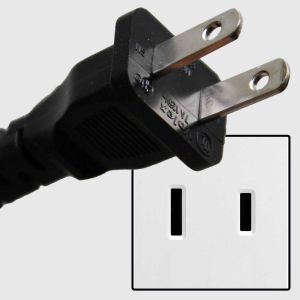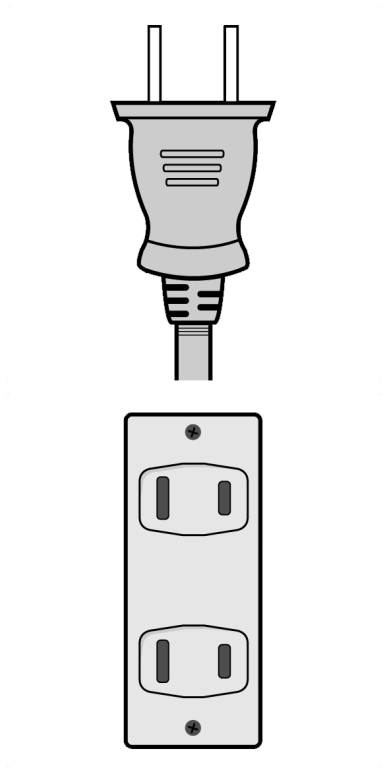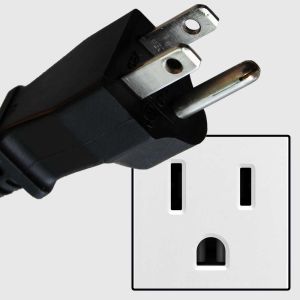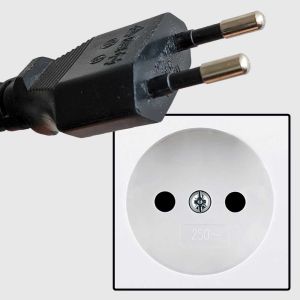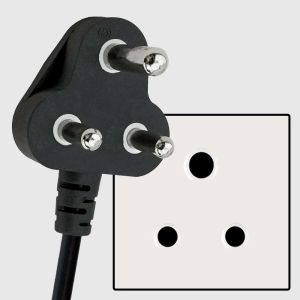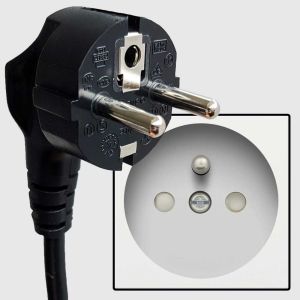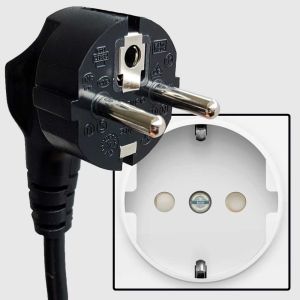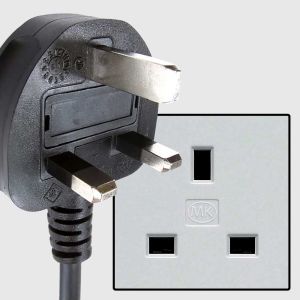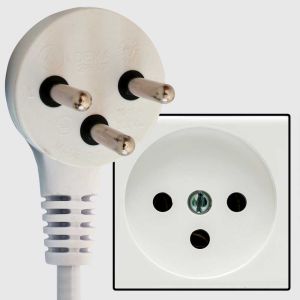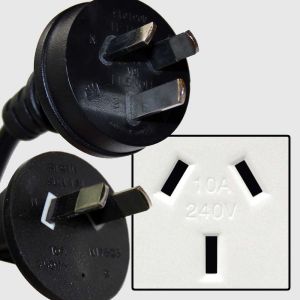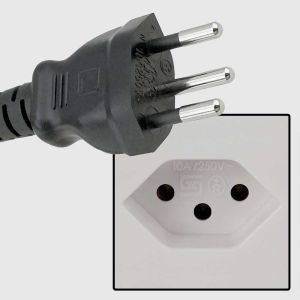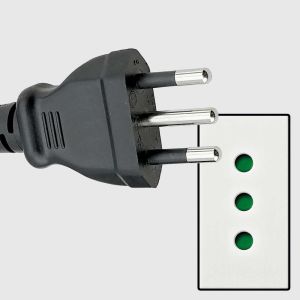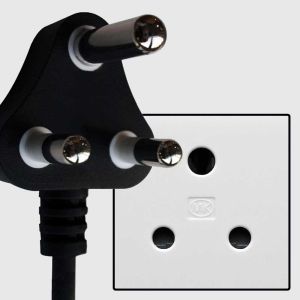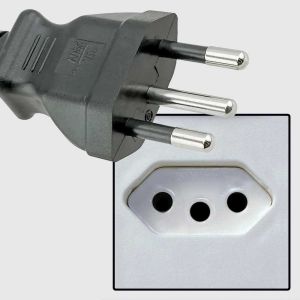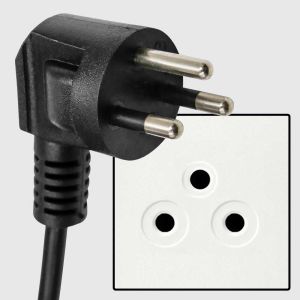曾工致力于各类电子电器产品的国际国内认证、EMC整改,欢迎各位询价,提供专业服务,解决客户痛点!专治各种产品不合格!
电话:139 2899 3907 邮箱:info@emc.wiki
“World plugs”的版本间差异
| (未显示同一用户的1个中间版本) | |||
| 第61行: | 第61行: | ||
Note: The CEE 7/7 plug was developed to work with Type E and Type F sockets with a female contact (to accept the earthing pin of the Type E socket) and has earthing clips on both sides (to work with Type F sockets). | Note: The CEE 7/7 plug was developed to work with Type E and Type F sockets with a female contact (to accept the earthing pin of the Type E socket) and has earthing clips on both sides (to work with Type F sockets). | ||
==Plug Type E by IEC== | ===Plug Type E by IEC=== | ||
[[文件:Plug Type E.jpg|2194x540px|无框|替代=Plug Type E|Plug Type E]] | [[文件:Plug Type E.jpg|2194x540px|无框|替代=Plug Type E|Plug Type E]] | ||
| 第153行: | 第153行: | ||
===Plug Type K by IEC=== | ===Plug Type K by IEC=== | ||
[[文件:Plug Type K.jpg|2196x546px|无框|替代=Plug Type K|Plug Type K]] | [[文件:Plug Type K.jpg|2196x546px|无框|替代=Plug Type K|Plug Type K]] | ||
== Plug Type L == | |||
基本只就是意大利插头和智利插头使用 | |||
10A 16A | |||
220 – 240 V | |||
10A插座与插头类型C和L(10 A 版本)兼容 | |||
16A插座与插头类型C和L(16 A 版本)兼容 | |||
[[文件:Plug-type-L.jpg|1000*1000px|无框]] | |||
Used in: Italy | |||
There are two variations of the Type L plug, one rated at 10 amps, and one at 16 amps. The 10 amp version has two round pins that are 4 mm thick and spaced 5.5 mm apart, with a grounding pin in the middle. The 16 amp version has two round pins that are 5 mm thick, spaced 8mm apart, as well as a grounding pin. Italy has a kind of “universal” socket that comprises a “schuko” socket for C, E, F and L plugs and a “bipasso” socket for L and C plugs. | |||
===Plug Type L by IEC=== | |||
[[文件:Plug Type L.jpg|2199x544px|无框|替代=Plug Type L|Plug Type L]] | |||
==Plug Type M== | |||
主要是用于南非插头 (与插头类型M兼容) | |||
15A | |||
220 – 240 V | |||
[[文件:Plug-type-M.jpg|1000*1000px|无框]] | |||
Used in: South Africa, Swaziland, Lesotho | |||
The Type M plug has three round pins in a triangular pattern and looks similar to the Indian Type D plug, but its pins are much larger. Type M plugs are sometimes used for bigger appliances in countries that make use of Type D plugs, as well as in Israel (Type H). Therefore, sockets in these countries sometimes work with Type M plugs. | |||
===Plug Type M by IEC=== | |||
[[文件:Plug Type M.jpg|2192x544px|无框|替代=Plug Type M|Plug Type M]] | |||
==Plug Type N== | |||
巴西插头和南非插头 (与插头类型C和类型N兼容) | |||
10A 16A 20A | |||
100 – 240 V | |||
[[文件:Plug-type-N.jpg|无框]] | |||
Used in: Brazil | |||
There are two variations of the Type N plug, one rated at 10 amps, and one at 20 amps. The 10 amp version has two round pins that are 4 mm thick, and a grounding pin. The 20 amp version, used for heavier appliances, has two round pins 4.8 mm in diameter, and a grounding pin. The Type N socket was designed to work with Type C plugs as well. | |||
Brazil is one of the few countries that uses two types of voltage. While most states use 127 V, some of them use 220 V. It is therefore important to find out the local voltage before plugging in your appliance (note: wrong voltage can destroy your appliance). Many appliances sold in Brazil are dual voltage. | |||
===Plug Type N by IEC=== | |||
[[文件:Plug Type N.jpg|2192x547px|无框|替代=Plug Type N|Plug Type N]] | |||
==Plug Type O== | |||
泰国插头 (与插头类型C和类型O兼容,与插头类型E、F不兼容) | |||
16 A | |||
220 – 240 V | |||
[[文件:Plug-type-O.jpg|无框]] | |||
Type O is used exclusively in Thailand. | |||
The type O socket and plug, rated at 16 amps, are the official standard in Thailand. The plug system was designed in 2006, but its use is not widespread as yet. It is currently gradually being phased in. The standard is described in TIS 166-2549. | |||
Type O consists of two power pins and an earth pin, which are round and have a 4.8 mm diameter. The power pins measure 19 mm in length, they have 10 mm long insulated sleeves and their centers are spaced 19 mm apart. | |||
===Plug Type O by IEC=== | |||
[[文件:Plug Type O.jpg|2189x546px|无框|替代=Plug Type O|Plug Type O]] | |||
2024年3月1日 (五) 17:08的最新版本
Plug Type A
Used in: North and Central America, Japan
The Type A electrical plug (or flat blade attachment plug) is an ungrounded plug with two flat parallel pins. Although the American and Japanese plugs appear identical, the neutral pin on the American plug is wider than the live pin, whereas on the Japanese plug both pins are the same size. As a result, Japanese plugs can be used in the US but often not the other way around.
The pins on Type A and Type B plugs have a hole near the tip that fits into ‘bumps’ found on the contact wipers of some sockets, so that the pins are gripped more tightly allowing for better contact and also to prevent the plug from slipping out of the socket. Some sockets have spring-action blades that grip the sides of the pins, making the holes obsolete.
Plug type A By IEC
Plug Type B
Used in: North and Central America, Japan
The Type B electrical plug has two flat parallel pins and a round grounding (or earth) pin. The earth pin is longer than the other two so that the device is grounded before the power is connected. As with the type A plugs, the American and Japanese versions vary slightly.
Type B plugs are rated at 15 amps.
Plug type B by IEC
Plug Type C
Used in: Europe, with the exception of the UK, Ireland, Cyprus and Malta
The Type C electrical plug (or Europlug) is a two-wire plug that has two round pins. It fits into any socket that accepts 4.0 – 4.8 mm round contacts on 19 mm centres. They are being replaced by E, F, J, K or N sockets which work perfectly with Type C plugs.
Type C plugs are generally limited for use in appliances that require 2.5 amps or less.
Plug Type C by IEC
Plug Type D
Used in: India, Sri Lanka, Nepal, Namibia
The Type D electrical plug has three large round pins in a triangular pattern. Type M plugs are often used alongside Type D plugs for larger appliances and as a result, some sockets work with both Type D and Type M plugs.
Type D plugs are rated 5 amps.
Plug Type D by IEC
Plug Type E
Used in: France, Belgium, Slovakia and Tunisia among others
The Type E electrical plug has two 4.8 mm round pins spaced 19 mm apart and a hole for the socket's male earthing pin. The Type E plug has a rounded shape and the Type E socket has a round recess. Type E plugs are rated 16 amps.
Note: The CEE 7/7 plug was developed to work with Type E and Type F sockets with a female contact (to accept the earthing pin of the Type E socket) and has earthing clips on both sides (to work with Type F sockets).
Plug Type E by IEC
Plug Type F
Used in: Germany, Austria, the Netherlands and Spain among others
The Type F electrical plug (also known as a Schuko plug) has two 4.8 mm round pins spaced 19 mm apart. It is similar to the Type E plug but has two earth clips on the side rather than a female earth contact. The CEE 7/7 plug was developed to work with sockets E and F and has grounding clips on both sides (to work with Type F sockets) and a female contact (to accept the grounding pin of the type E socket).
Type F plugs are rated 16 amps.
Plug Type F by IEC
Plug Type G
Used in: UK, Ireland, Cyprus, Malta, Malaysia, Singapore, Hong Kong
The Type G electrical plug has three rectangular blades in a triangular pattern and has an incorporated fuse (usually a 3 amps fuse for smaller appliances such as a computer and a 13 amps one for heavy duty appliances such as heaters). British sockets have shutters on the live and neutral contacts so that foreign objects can’t be introduced into them.
Plug Type G by IEC
Plug Type H
Used in: Israel
The Type H plug is unique to Israel and has two flat pins in a V-shape as well as a grounding pin. It is however currently being phased out in favour of a round-pinned version. The holes in Type H sockets are wide in the middle so as to accommodate the round-pinned version of the Type H plug as well as Type C plugs.
Plug Type H by IEC
Plug Type I
主要用于澳大利亚插头、新西兰插头、中国插头和阿根廷插头
10A
220 – 240 V
与I型插头兼容
Used in: Australia, New Zealand, Papua New Guinea, Argentina
The Type I plug has two flat pins in a V-shape as well as a grounding pin. A version of the plug, which only has the two flat pins, exists as well. The Australian plug also works with sockets in China.
Australia’s standard plug/socket system is rated 10 amps but a plug/socket configuration rated 15 amps also exists, although the ground pin is wider. A standard 10 amp plug will fit into a 15 amp socket but not the other way around.
Plug Type I by IEC
Plug Type J
基本只用在瑞士插头和列支敦士登插头使用 (与插头类型C和类型J兼容)
10A
220 – 240 V
Used in: Switzerland and Lichtenstein
The Type J plug has two round pins as well as a grounding pin. Although the Type J plug looks a lot like the Brazilian Type N plug it is incompatible with the Type N socket as the earth pin is further away from the centre line than on Type N. However, Type C plugs are perfectly compatible with Type J sockets.
Type J plugs are rated 10 amps.
Plug Type J by IEC
Plug Type K
基本只用在丹麦插头和格陵兰(格陵兰岛)插头
16A
220 – 240 V
与插头类型C和类型K兼容,与E、F类型插头不兼容
Used in: Denmark and Greenland
The Type K plug has two round pins as well as a grounding pin. It is similar to Type F, the difference being that Type F has grounding clips instead of a grounding pin. Type C plugs are perfectly compatible with Type F sockets. Type E plugs and sockets are also used in Denmark.
Plug Type K by IEC
Plug Type L
基本只就是意大利插头和智利插头使用
10A 16A
220 – 240 V
10A插座与插头类型C和L(10 A 版本)兼容
16A插座与插头类型C和L(16 A 版本)兼容
Used in: Italy
There are two variations of the Type L plug, one rated at 10 amps, and one at 16 amps. The 10 amp version has two round pins that are 4 mm thick and spaced 5.5 mm apart, with a grounding pin in the middle. The 16 amp version has two round pins that are 5 mm thick, spaced 8mm apart, as well as a grounding pin. Italy has a kind of “universal” socket that comprises a “schuko” socket for C, E, F and L plugs and a “bipasso” socket for L and C plugs.
Plug Type L by IEC
Plug Type M
主要是用于南非插头 (与插头类型M兼容)
15A
220 – 240 V
Used in: South Africa, Swaziland, Lesotho
The Type M plug has three round pins in a triangular pattern and looks similar to the Indian Type D plug, but its pins are much larger. Type M plugs are sometimes used for bigger appliances in countries that make use of Type D plugs, as well as in Israel (Type H). Therefore, sockets in these countries sometimes work with Type M plugs.
Plug Type M by IEC
Plug Type N
巴西插头和南非插头 (与插头类型C和类型N兼容)
10A 16A 20A
100 – 240 V
Used in: Brazil
There are two variations of the Type N plug, one rated at 10 amps, and one at 20 amps. The 10 amp version has two round pins that are 4 mm thick, and a grounding pin. The 20 amp version, used for heavier appliances, has two round pins 4.8 mm in diameter, and a grounding pin. The Type N socket was designed to work with Type C plugs as well.
Brazil is one of the few countries that uses two types of voltage. While most states use 127 V, some of them use 220 V. It is therefore important to find out the local voltage before plugging in your appliance (note: wrong voltage can destroy your appliance). Many appliances sold in Brazil are dual voltage.
Plug Type N by IEC
Plug Type O
泰国插头 (与插头类型C和类型O兼容,与插头类型E、F不兼容)
16 A
220 – 240 V
Type O is used exclusively in Thailand.
The type O socket and plug, rated at 16 amps, are the official standard in Thailand. The plug system was designed in 2006, but its use is not widespread as yet. It is currently gradually being phased in. The standard is described in TIS 166-2549.
Type O consists of two power pins and an earth pin, which are round and have a 4.8 mm diameter. The power pins measure 19 mm in length, they have 10 mm long insulated sleeves and their centers are spaced 19 mm apart.
